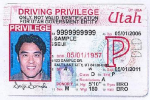Utah Driving Privilege
Card (click to enlarge) |
This story from the Salt Lake Tribune about driving privilege cards and getting into bars is a good example of the issues surrounding identity, attributes, and authorization.
For some background, a few years ago, Utah passed a driving privilege card (DCP) law that gave undocumented workers a legal way to drive without issuing them a drivers license. A drivers license has legally mandated identity functions for the federal, state, and local governments that extend beyond authority to drive--voter registration, as one example. The reasoning for issuing any card at all to undocumented individuals is pretty sound. You want undocumented individuals to be able to get insurance so that you don't have a huge pool of uninsured motorists.
The Tribune story tells of a University of Utah student, aged 22, who was refused entry into a bar because the bar owners believed that the DCP wasn't an acceptable form of identification. The response from the Utah Department of Alcoholic Beverage Control (UDABC) is an interesting look at identification policy:
The law doesn't extend to private clubs, restaurants, taverns or any place with a state liquor license, [Sharon Mackay] says. State law doesn't say that such places even need to check identification cards before entering their establishments, she says. The law requires that they do not sell to people under 21.
"We don't tell them what they can or not accept," she says. "They need to make sure that whatever they're accepting is valid and reliable, so they're not putting themselves in jeopardy of selling to a minor."From Salt Lake Tribune - Driver cards brew mix-up at pubs
Referenced Sat Mar 17 2007 07:35:46 GMT-0600 (MDT)
State law just wants an outcome, the use of identity in this situation is merely a means to an end. The drivers license and DCP are just ways of getting an attribute (birth date) from a trusted third party (the State in this case).





